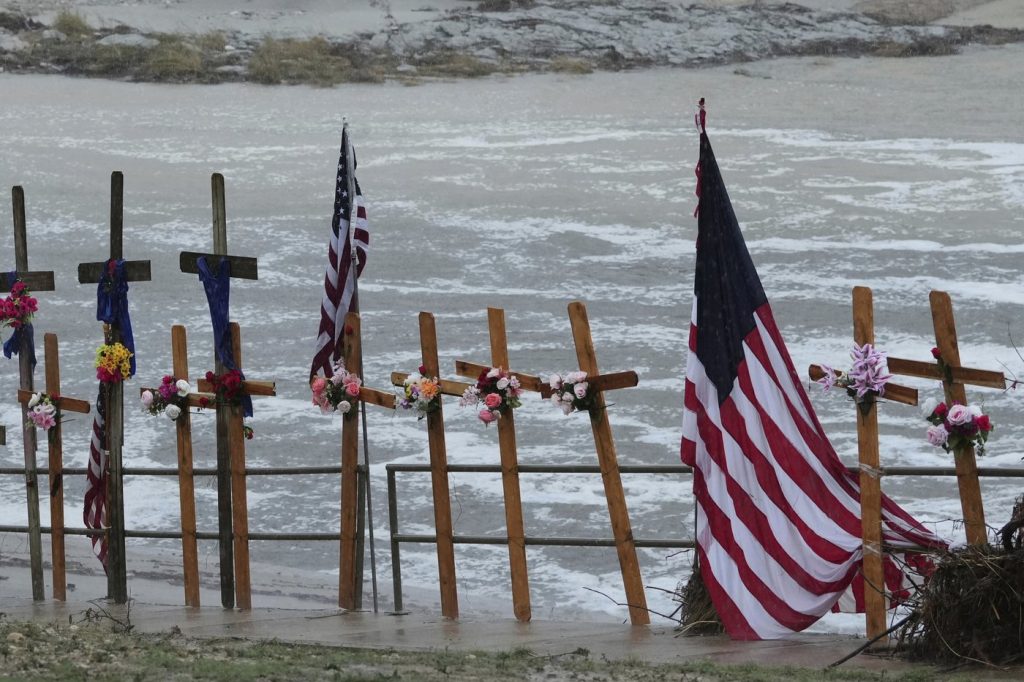AUSTIN, Texas (AP) – The search for victims of the devastating flooding in Texas Hill Country is now entering its third week, as officials strive to determine the exact number of individuals still missing. As this situation unfolds, Texas lawmakers are preparing to discuss the authorities' initial response to the floods and the need for improved warning systems.
During the Fourth of July holiday weekend, catastrophic flash floods claimed at least 135 lives in Texas, primarily affecting areas along the Guadalupe River in Kerr County, situated about 60 miles (100 kilometers) northwest of San Antonio. The region's geological characteristics contribute to its vulnerability to flash flooding, as the dry and compact soil is incapable of absorbing heavy rainfall, which can lead to rapid water accumulation.
The Texas Legislature is convening for a special session starting Monday. Originally called by Governor Greg Abbott for unrelated matters, the agenda has expanded to include discussions on the flooding crisis. Lawmakers are now tasked with assessing the initial response of authorities and exploring ways to enhance the region's warning systems.
Currently, state officials are reporting approximately 100 people as missing across Kerr and other counties, a reduction from earlier estimates of about 160 unaccounted individuals. This decrease is attributed to several factors, including the recovery of victims, establishing contact with some who were found safe, and the clarification of reports that were later deemed unsubstantiated or false. The list of missing individuals continues to fluctuate as new reports are received through a dedicated hotline.
The destructive impacts of the floods have severely affected the Hill Country, where vacation cabins and youth camps line the riverbanks and valleys of Kerr County. Notably, the century-old Camp Mystic, a Christian summer camp for girls situated in a low-lying area along the Guadalupe, was one of the hardest hit, resulting in the tragic loss of at least 27 campers and counselors.
As part of the special session agenda, Governor Abbott aims for the legislature to pass measures regulating the booming THC product market, an issue that became contentious following his veto of a bill aimed at banning such products. Additionally, since the floods, former President Donald Trump has urged Republican officials to redraw congressional districts in order to bolster their chances of retaining a U.S. House majority in the 2024 midterm elections.
Abbott expressed the necessity for lawmakers to examine how flooding was managed and to consider potential improvements in the state's warning systems, especially as Kerr County lacks a functioning warning system due to missed funding opportunities by state and local agencies over the past decade.
Both Trump and Abbott have firmly defended the local authorities' response to the flooding, dismissing questions regarding their effectiveness. In a recent press encounter, Trump labeled a reporter as "evil" for raising concerns, insisting that all involved did an extraordinary job given the circumstances. Meanwhile, Abbott downplayed inquiries about accountability, suggesting that in sports, mistakes are part of the game and that it is unhelpful to assign blame.
Lawmakers are planning a visit to Kerrville, the hardest-hit area in Kerr County, on July 31 to gather input from local residents about their experiences during the flooding. A joint hearing is scheduled to take place on Wednesday, focusing on the state’s response to the fatal floods, proactive flood planning, infrastructure management for flood events, and communications among first responders.
One legislative proposal has already been introduced by Republican Representative Don McLaughlin, which would mandate that the state’s top public health official establish building standards for youth camps located within 100-year floodplains, as defined by FEMA as a high-risk area with a 1% chance of flooding annually.
As representatives prepare for their hearings and discussions, Republican state Representative Drew Darby emphasized the importance of learning from this disaster, acknowledging that while the victims cannot be returned, the lessons drawn from this event are vital for preventing future tragedies.











